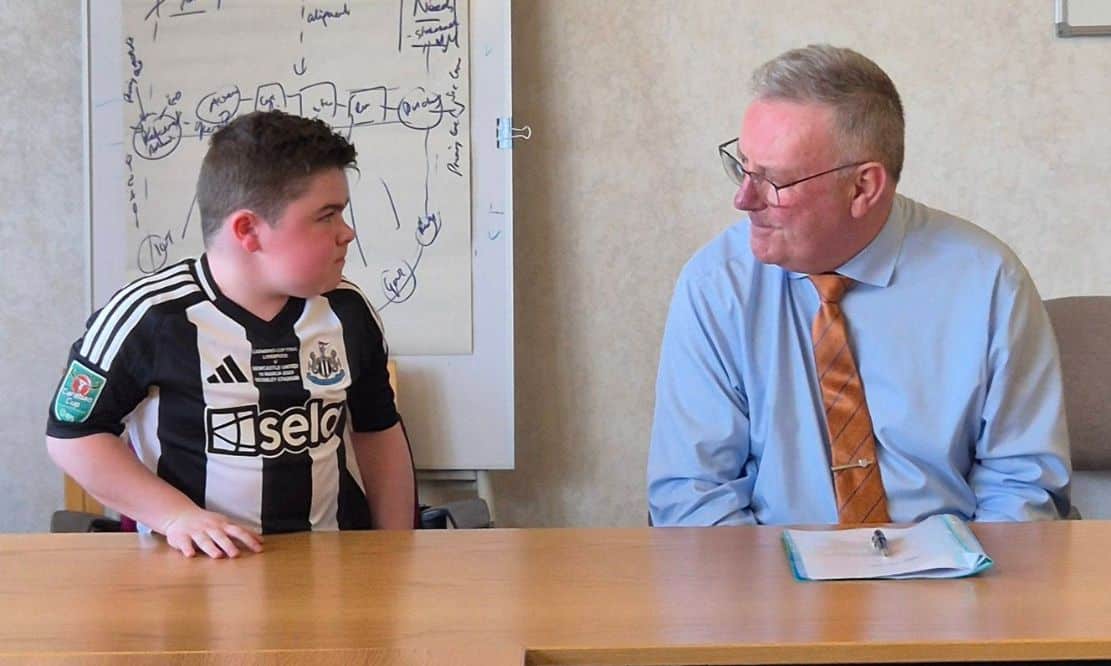
The family of a Newry boy fighting for access to a new “life-changing” medication are now challenging the Belfast Health and Social Care Trust’s cost estimation for access to the drug – calling it “ludicrous”.
Jamie and Colleen Pentony – the parents of 12-year-old Alfie Pentony – have been campaigning for their son’s access to treatment since his diagnosis in 2016 with Duchenne Muscular Dystrophy.
For almost ten years, Alfie has been managing the inherited muscle wasting condition through bi-annual appointments at a private hospital in Newcastle, steroid medication and yearly visits to America for advanced specialist treatment.
However, in February of this year, a new trial drug called Givinostat was approved for UK use by Medicines and Healthcare products Regulatory Agency (MHRA) for all people with DMD aged 6 and older.
Access to this drug, however, has not yet been granted for Alfie and 12 others like him living in Northern Ireland.
Colleen spoke to Armagh I in February about The Health Trust’s lack of engagement in the drug’s free Early Access Programme (EAP) – for which they cited cost and storage issues as the reason not to engage.
As parents of a child with DMD, Colleen and Jamie understand that “time is muscle”. They repeat it endlessly because as each second passes Alfie – and those like him – are edging progressively closer to losing their ability to walk.
And – in order to participate in Givinostat’s EAP – the boys must be “ambulant” (independently walking).
After meeting with the Health Minister for Northern Ireland, Mike Nesbitt in May Colleen believed there may have been hope on the horizon.
Related: 12-year-old Newry DMD warrior discusses access to ‘life-changing’ drug with NI Health Minister
However, just over one month on and those hopes have – once again – been dashed, she says.
In response to a Freedom of Information (FOI) request, the Belfast Health and Social Care Trust have informed that the costs associated with a “full year effect” including resources for engagement in the programme to be a whopping £309,000.
The FOI did stipulate that the information should be “heavily caveated” with the following points, included herein verbatim from the report:
- It is critical to note that this is not simply a matter of the financial resource availability. Even if money was allocated, there would be a significant lead in time to recruitment of the specialist staff required to start this service.
- Recruitment to jobs that are lower than a Whole Time Equivalent (WTE) are often very hard to recruit to and require that the post is made full time to attract the correct staff.
- There may be difficulty recruiting into the Neurology team for all posts and each postholder may need a period of upskilling and training.
- These figures reflect the minimum resource requirement based on our current intelligence and the numbers within the ambulant population but would increase depending on the final NICE guidance.
Speaking to the cost analysis provided by the Trust, Colleen said: “The Belfast Trust have come up with an absolutely ridiculous costing of £309,000 to treat 13 boys. This is a ludicrous price and we believe it to be totally untrue.
“This is absolutely disgusting that the Trust are able to do this to these boys’ lives. No one is putting a price tag on my son’s life especially one that is totally untrue.”
Colleen’s claims that the Trust’s cost estimation are “untrue” are based solely on a Channel 4 News report published on May 28 that outlines the Oxford University Hospitals Trust’s business case to have calculated costs in the region of £66,000 for the treatment of between 35 and 40 patients with the condition.
With expected costs of £66,000 the Oxford University Hospitals Trust have also declined to participate in the programme, according to the publication.
The report by Channel 4 News states: “Channel 4 News has now seen internal emails from the Oxford University Hospitals Trust, discussing the potential costs of introducing the drug.
“Professor Andrew Brent, the trust’s medical officer, writes: “Unfortunately, however, given the current financial climate and the expectation … to make significant savings, we are not in a position to fund services/treatments that are not nationally approved without stopping doing something else.”
“The trust’s chief finance officer responded, stating: “It is not our job to fund new medicines that are not NICE approved.”
“Later in a statement Professor Brent said: “It is a measure of the importance we place on Givinostat that we have been working on a business case before the drug has been approved by NICE. We will continue working towards being able to offer the treatment once approved by NICE, as we hope it will be.”
“That business plan seen by Channel 4 News said it will cost just over £66,000 for about 35-40 patients.”
The publication called access to the drug a “postcode lottery” and this is a viewed shared by the UK’s leading Duchenne muscular dystrophy charity, Duchenne UK – who have been actively supporting families seeking access to Givinostat.
Speaking to Armagh I, Will Pender, Senior Policy Manager for Duchenne UK said: “Northern Ireland is the only part of the UK which is providing zero access to this treatment. Scotland is rolling it out, as is South Wales, and access is piecemeal in England but at least some boys are getting it.
“Meanwhile in Belfast there’s been no movement at all.
“On costings, the £309k for 13 boys is literally unbelievable. Oxford University Hospital NHS Foundation Trust estimated £66K for 35 boys – which I still think is a conservative overestimate to cover all bases but is in the realm of reality.
“The trust in Belfast thinks it will cost ten times as much, which makes no sense.”






